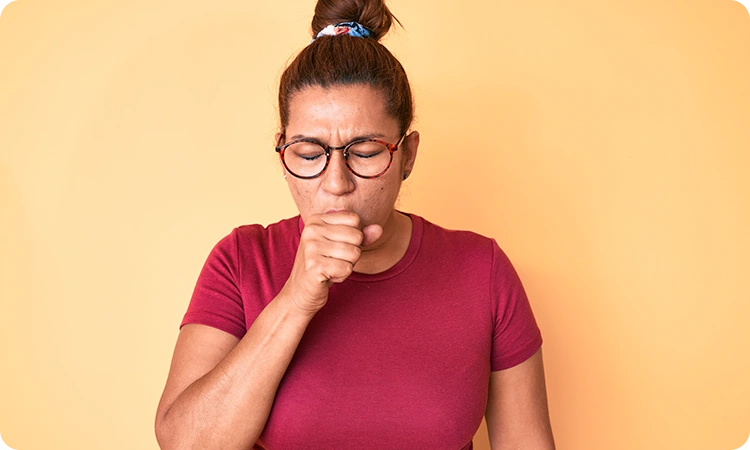Respiratory Diseases
Respiratory Diseases Treatment in Dubai
Allergic Rhinitis

Allergic rhinitis or hay fever occurs when the body’s immune system overreacts to the particles in the environment that typically causes no problems in most people. This IgE-mediated immunological response causes inflammation of nasal mucosa. The signs and symptoms are runny nose, itchy eyes, mouth or skin, sneezing, stuffy nose due to blockage or congestion and fatigue. Allergic rhinitis can be classified into seasonal and perennial. Seasonal type occur in spring, summer, and early fall and are usually caused by allergic sensitivity to airborne mold spores or to pollens. People with perennial allergic rhinitis experience symptoms throughout the year. The causative factors are dust mites, pet hair, cockroaches, mold etc. Allergic rhinitis occurs along with asthma and may be associated with otitis media, Eustachian tube dysfunction, sinusitis, nasal polyps, allergic conjunctivitis, and atopic dermatitis. It may also contribute to learning difficulties, sleep disorders etc.
The Ayurvedic management of Allergic Rhinitis recommends avoidance of allergens causing reaction, detoxification, pacification & rejuvenation therapies. Snehana nasya is very beneficial in allergic rhinitis. Use of blood-purifying and immunity enhancing herbs and formulations helps in reducing the autoimmune respose.
Dr. Shyam’s Ayurveda Clinic in Dubai is renowned for its exceptional respiratory diseases treatment in Dubai. Our expert practitioners utilize Ayurvedic therapies and personalized care to address a wide range of respiratory conditions, providing effective solutions for patients seeking relief and improved lung health. Trust our clinic in Dubai for holistic and specialized care for respiratory diseases.
Ayurveda Treatment for Respiratory Diseases
Treatment tips:
- Avoid outdoor allergens, such as pollens, grass, weeds, mold, pet hair or dander, dust mites, cigarette smoke, perfume, and diesel exhaust.
- Favor light food, lukewarm water, legumes, soups etc.
- Favor Kapha reducing foods which are little spicy, salty.
- Avoid food that are heavy in nature, fermented , too cold, sour food, meat, banana, yellow grams, etc.
- Avoid sweets, ice-creams, cakes, desserts.
- Avoid yogurt and curds.
- Avoid Alcohol and cold beverages.
- Yoga and pranayama helps in regulating the breathing and enhances healing.
Respiratory Diseases Treatment in Dubai
Bronchitis

Bronchitis is the inflammation of the lining of the bronchi, which are the large airways of lungs. Inflammation of the bronchi due to various triggers, such as common viral infection, allergens, pollutants, etc. leads to thickening of mucosal layer, shedding of epithelial cells, and stripping of the basement membrane. This condition presents with a productive cough, malaise, difficulty breathing, and wheezing, among which cough is the predominant symptom. Tobacco smoking, environmental pollution, unaccustomed occupational particles are major causes of bronchitis.
In ayurveda, bronchitis may be compared to Kasa roga, which is a vata kapha predominant condition. Cough is caused by the vitiated kapha obstructing to the pathway of the normal pathway of pranavata. In Ayurveda, herbs and formulations are utilized to remove this obstruction. These medications help in pacifying aggravated kapha and vata.
Treatment Tips:
- Avoid Alcohol, tobacco, pickles, curd, ice cream and cold drinks
- Favor warm gruel made barley, soup made of horsegram and topped with a little of long pepper.
- Reduce the exposure to cold rain and wind
- Wash your hands frequently and wear a mask.
- Physical exertion and heavy exercises should be avoided
- Favor light stretching and yoga to improve circulation
- Meditate to avoid stress and tension
- Ayurvedic medications like Dasamoola kwatha, pippalyadi choorna, kantakari ghrita, dasamoola hareetaki, lavangadi vati, vyaghryadi kashayam, yashtimadhu choorna, sitopaladi choorna, talisaadi choorna, agastya rasayanam etc.
- Take medications only after consultation with one of the best doctors in Dubai and Ajman at Dr. Shyam’s Ayurveda Centre.
Respiratory Diseases Treatment in Dubai
Asthma

Bronchial Asthma is a chronic inflammatory disease of airway which causes difficulty in breathing or shortness of breath. It can be classified as primary and secondary, with primary originating from respiratory system, and secondary originating from other systems of the body but the impact is on respiratory system. It presents with recurrent episodes of wheezing, breathlessness, tightness of chest and cough particularly at night or early morning.
Tamaka swasa is almost equivalent to asthma and is mainly caused by the Vata and Kapha doshas. Chronic allergy is a major cause and it diminishes the natural body immunity to resist infections. Asthma is among the commonest chronic diseases of childhood along with allergy. Ayurvedic line of management can act as an improved and effective version for the management of asthma. Recurrent attacks of asthma diminish the vitality of tissues and reduce the innate immunity. The vitality of tissues is further hampered by the improper nutrition due to altered digestion. Unless the condition is resolved and immunity reinstalled, there’s no hope for optimum health. Preventing the reoccurrence of asthma is one of the most important goals in asthma management and it can be achieved through Ayurveda. Methods such as Swedana (medicated steam), vamana (Therapeutic emesis)and virechana (Therapeutic purgation) will help in eliminating the vitiated Kapha. Practice of Pranayama, laxatives, light diet in the night and use of warm water will helps in the treatment of Asthma.
Treatment Tips:
- Avoid house dust, pollen, mold, animal dander.
- Avoid intake of cold water and exposure to cold and dry climate, cooking gas fumes, passive cigarette smoking, paints, sprays.
- Avoid colouring agents of food, food preservatives, ice creams.
- Avoid Vigorous exercise particularly on cold and dry day and stress.
- Reduce intake of dry, cold , heavy, incompatible food and irregularity in the consumption of food
- Reduce excessive Intake of black gram, beans, sesame, meat of aquatic animals.
- Favor wheat, Old rice, green gram, Horse gram, barley, snake gourd, Garlic, Turmeric, Ginger, Black pepper, Luke warm water, Goat milk, Honey.
- Respiratory exercise, Pranayama, Yoga are also beneficial.
- Ayurvedic formulations which can be used in asthma are Talisadi Churna , Sitopaladi churna, Kanakasava , Trikatu churna, Vasavalehyam, Kantakaryavalehyam, Vyaghriharitaki Avaleha, Agastya Haritaki Avaleha, Lavangadi vati, Swasakutara rasa, Mahalakshmivilas rasa, dasamoola kadutryam kashayam, amrutottaram kashaya, etc.
Respiratory Diseases Treatment in Dubai
COPD ( Chronic Obstructive Pulmonary Disease )

COPD is a group of diseases that cause block to the airflow and breathing-related conditions. The terms chronic bronchitis and emphysema are no longer used, they are now included within the Chronic Obstructive Pulmonary Diseases (COPD). It is a progressive disease thus worsens over time. The long terms exposure to the causative factors such as cigarette smoking and air pollution, will result in inflammatory response in the lungs, narrowing of the small airways and breakdown of lung tissue. Genetics also play a role in this disease.
Ayurveda considers COPD as a disease of ‘Pranavaha srotas’ (Tracheobronchial tree) and is termed as ‘Swasa roga’ due to the cardinal feature abnormal, rapid or difficulty in breathing. According to Ayurveda, avoidance of causative factors is considered as the first line of treatment. It also includes modification of lifestyle and diet. Shamana, a pacification treatment, which can be done through intake of oral medications and Shodhana, which is a biopurification , are advised after proper evaluation by our doctors.
Treatment Tips:
- Decrease / avoid tobacco smoking
- Improve the indoor and outdoor air quality
- Avoid close contact with people suffering from respiratory infection
- Avoid exposure to excessive heat, cold and high altitudes and environmental irritants.
- Favor diet containing whole grains.
- Favor vegetables such as gourd, bottle gourd, spinach, methi, garlic, ginger, bittergourd, spongegourd, drumstick, and pulses like greengram and horsegram.
- Avoid food preparations with tomato, cauliflower, potatoes, preparations of rice flour, sweets, curd, whole milk, black gram.
- Avoid fermented and sour foods, cold drinks and refrigerated foods.
- Ensure a well-ventilated, hygienic environment.
- Avoid usage of sprays or deodorants.
- Avoid being indoors when cleaners or sprays are being used.
- Nasya is beneficial in maintaining the integrity of membrane lining the nasal cavity and thus reduce infection or inflammation due to contact with irritants or pollutants.
Regular exercise and maintain normal body weight to help in preventing COPD.
